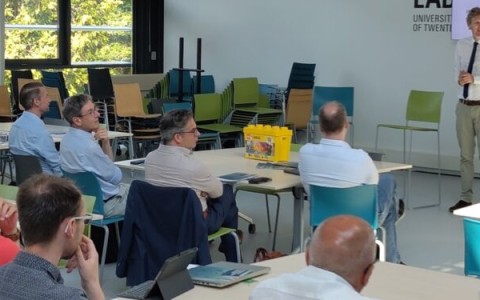Dennis Moeke: 'Research is not just doing studies, it is also visioning'

We are living longer and longer, and living at home for longer. As a result, we rely more often on long-term home care. At the same time, neighbourhoods and cities are becoming more crowded, putting increasing pressure on care. This brings challenges: How do we combat loneliness? How do we ensure that the right care gets to the right residents on time? Dennis Moeke, lecturer at the Hogeschool Arnhem Nijmegen, saw an opportunity: together with his research team, he developed a system for smartly integrating healthcare, welfare and logistics for vulnerable citizens in the neighbourhood, with the aim of reducing loneliness and creating a scalable and transferable business model.
We are facing increasingly complex tasks. Companies and organisations cannot solve them on their own: they require complex collaborations in which - besides the right people - the right knowledge must also be present.
Dennis Moeke, lecturer Hogeschool Arnhem Nijmegen
What started as a research project on the logistics of long-term care has since grown into a foundation in Deventer that helps vulnerable citizens, as well as caregivers in the neighbourhood, on a daily basis. 'We do this by deploying neighbourhood concierges. For the neighbourhood, they are the familiar face and the linking pin to care and assistance. The neighbourhood concierge delivers bundled medicines, groceries and meals, and also keeps an eye on things,' says Moeke. In this way, the neighbourhood concierge is often the first to spot the resident's needs or requests for help, and, because of his role as a spider in the web, can easily link up with agencies that can help. 'A great example is of one of the neighbourhood concierges who distributes medicines. After several times leaving the door ajar when he came by, he was eventually allowed to put the medicines directly in the fridge. There he found several medicines that were long past their expiry date. The pharmacy was quite upset by this story, as using these medicines could pose major health risks. As a result, from now on, medication will be arranged centrally via the neighbourhood concierge, who, besides delivering the medicines, will also keep an eye on whether they can still be used. A fine solution for both the resident and the pharmacy.'
Neighbourhood concierges nationwide
Moeke hopes that deploying neighbourhood concierges will also become the standard in other parts of the Netherlands. In the research project, much attention has been paid to making the business model scalable and transferable, in order to relieve the pressure on care throughout the Netherlands: 'We do our best to develop knowledge, but we also want to disseminate the knowledge so that others can also benefit from it, both residents and care institutions. Practice-based research is very important in this story, as it provides support for transitions needed in care. For example, we are also working on smarter planning of home care, working with mathematics and AI.'
Knowledge as Research and Development (R&D) for healthcare institutions and SMEs
Within this research project, Moeke collaborates with many different organisations. The role of researchers in this is unique. 'With this kind of project, as a researcher you find yourself in a rather complicated ecosystem of organisations that have different interests. The researcher can then more easily be the neutral factor and thus build the network without interests.' And that can lead to great things. Moeke: 'Long-term care institutions, but also SMEs, often do not have the resources for an independent R&D department. By working together in a research consortium, we can actually carry out part of their R&D. In doing so, we help each other: healthcare institutions and SMEs can innovate and we gather knowledge for complex social issues.'
And that is badly needed, according to Moeke: 'We are facing increasingly complex tasks. Companies and organisations cannot solve them alone: they require complex collaborations in which - besides the right people - the right knowledge must also be present. Research is much more than just doing studies: it is supporting vision creation'.
According to Moeke, we have the research field in the Netherlands in good shape, and that is something we can be proud of: 'We have built a fine infrastructure for research in the Netherlands in recent years. Through mission-driven research policy, we link research to social transitions. This is far from being the case in all countries.' In doing so, Moeke has another important message for Prinsjesdag: 'You don't create a knowledge infrastructure like in the Netherlands just like that, but tearing it down can be quite quick. We really need to watch out for that.'
This post previously appeared on NWO's site.
More news

TKI Dinalog, Top Sector Logistics and ROM Netherlands join hands during Region Visits Logistic Innovation

TKI Dinalog, Topsector Logistiek en ROM Nederland slaan handen ineen tijdens Regiobezoeken Logistieke Innovatie

